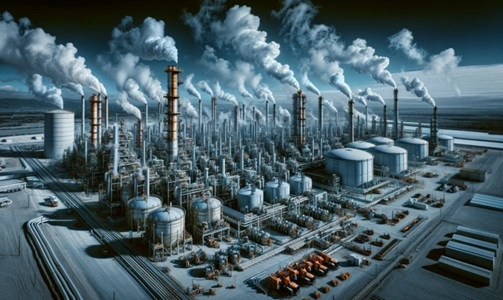Natural gas has become one of the most widely used energy sources worldwide, powering homes, businesses, and industries. Known for its efficiency and versatility, natural gas is often seen as a cleaner alternative to other fossil fuels like coal and oil. However, its use comes with both advantages and disadvantages, particularly in the context of climate change and environmental impact.
In this article, we’ll explore the pros and cons of natural gas, helping you better understand its role in the global energy landscape.
What is Natural Gas?

Natural gas is a fossil fuel primarily composed of methane (CH₄), along with small amounts of other hydrocarbons. It is found beneath the Earth’s surface, often alongside oil deposits, and is extracted through drilling. Once processed, natural gas can be used for heating, electricity generation, and as an industrial feedstock. It is also a critical component of liquefied natural gas (LNG) for easier transportation.
The Pros of Natural Gas
1. Abundant and Reliable Energy Source
Natural gas is one of the most abundant energy resources on the planet. Its widespread availability and established infrastructure make it a reliable energy source for meeting global energy demands.
2. Cleaner Burning
Compared to coal and oil, natural gas burns more cleanly, producing fewer pollutants and greenhouse gases. It emits approximately 50% less carbon dioxide (CO₂) than coal and about 20–30% less than oil, making it a relatively cleaner fossil fuel.
3. Versatility
Natural gas is a highly versatile energy source. It is used for:
- Electricity generation in power plants.
- Heating and cooling homes and businesses.
- Cooking and water heating in residential applications.
- Industrial processes, including manufacturing and chemical production.
- Transportation as a cleaner alternative to gasoline and diesel.
4. Efficiency
Natural gas is an efficient energy source, particularly for electricity generation. Modern combined-cycle power plants that use natural gas can achieve efficiency levels of up to 60%, compared to around 33% for coal-fired plants.
5. Lower Air Pollution
Burning natural gas produces fewer harmful air pollutants, such as sulfur dioxide (SO₂), nitrogen oxides (NOₓ), and particulate matter. This contributes to better air quality, reducing respiratory and cardiovascular health risks.
6. Cost-Effective
In many regions, natural gas is more affordable than other energy sources like electricity or oil. Its relative cost stability makes it an attractive option for heating, cooking, and industrial use.
7. Easily Transportable
Natural gas can be transported through pipelines, making it a convenient option for domestic and industrial use. Additionally, it can be converted into liquefied natural gas (LNG) for shipping across long distances, enabling global trade.
8. Supports Renewable Energy Integration
Natural gas-fired power plants can quickly ramp up or down, making them an excellent complement to intermittent renewable energy sources like wind and solar. This flexibility helps stabilize the energy grid.
9. Job Creation
The natural gas industry supports millions of jobs worldwide, including exploration, production, transportation, and distribution. It contributes significantly to local and national economies.
10. Energy Independence
For countries with significant natural gas reserves, utilizing this resource can reduce dependence on imported energy, enhancing national energy security.
The Cons of Natural Gas
1. Greenhouse Gas Emissions
Although cleaner than coal and oil, natural gas is still a fossil fuel and contributes to greenhouse gas emissions. Methane, its primary component, is a potent greenhouse gas, with a warming potential 25 times greater than CO₂ over a 100-year period. Methane leaks during extraction, processing, and transportation can significantly impact climate change.
2. Non-Renewable Resource
Natural gas is a finite resource formed over millions of years, making it non-renewable. While reserves are currently abundant, they will eventually deplete, necessitating a transition to renewable energy sources.
3. Environmental Impact of Extraction
The extraction of natural gas, particularly through hydraulic fracturing (fracking), can have adverse environmental consequences, including:
- Groundwater contamination from chemicals used in fracking.
- Land degradation and habitat disruption.
- Increased seismic activity due to wastewater injection into underground wells.
4. Infrastructure Costs
Building and maintaining the infrastructure for natural gas extraction, transportation, and storage requires significant investment. Pipelines, in particular, are expensive to install and maintain and can face opposition due to environmental and safety concerns.
5. Risk of Explosions
Natural gas is highly flammable, and leaks can pose serious safety risks. Pipeline explosions, storage facility accidents, and residential gas leaks can lead to property damage, injuries, or fatalities.
6. Dependence on Fossil Fuels
Relying on natural gas delays the transition to renewable energy sources, perpetuating dependence on fossil fuels. While it is considered a “bridge fuel” to a cleaner energy future, excessive reliance may slow investments in sustainable alternatives.
7. Price Volatility
Although natural gas is often cost-effective, its prices can be volatile, influenced by market demand, geopolitical factors, and weather conditions. This volatility can affect both consumers and businesses reliant on natural gas.
8. Methane Leaks
One of the most significant challenges with natural gas is methane leakage during extraction and transportation. Even small leaks can have a disproportionate impact on climate change due to methane’s high global warming potential.
9. Limited Availability in Remote Areas
In regions without established pipeline infrastructure, accessing natural gas can be challenging and expensive. This limits its use in certain parts of the world.
10. Conflict and Geopolitics
Control over natural gas reserves and pipelines can lead to geopolitical tensions and conflicts. Nations with abundant natural gas resources often wield significant influence in global politics, which can create dependencies and economic imbalances.
Who Should Consider Using Natural Gas?
Natural gas is an excellent choice for:
- Homeowners looking for efficient and cost-effective heating and cooking solutions.
- Businesses that require reliable and affordable energy for operations.
- Power producers seeking a flexible energy source to complement renewable energy.
- Countries aiming to reduce greenhouse gas emissions while transitioning away from coal and oil.
However, it may not be the best option for individuals or organizations focused on minimizing fossil fuel use and prioritizing renewable energy adoption.
Tips for Responsible Natural Gas Use
- Ensure Proper Maintenance: Regularly inspect and maintain natural gas appliances and pipelines to minimize leaks and improve safety.
- Support Renewable Integration: Use natural gas in combination with renewable energy sources to reduce overall carbon emissions.
- Invest in Leak Detection: Advocate for advanced technologies to detect and repair methane leaks during extraction and transportation.
- Explore Energy Efficiency: Combine natural gas use with energy-efficient practices to lower consumption and reduce environmental impact.
- Consider Alternatives: Gradually transition to renewable energy solutions like solar, wind, or geothermal where feasible.
Conclusion
Natural gas plays a vital role in meeting the world’s energy demands. Its efficiency, versatility, and cleaner-burning properties make it an attractive option for many applications, from residential heating to electricity generation. However, its environmental impact, finite nature, and extraction challenges highlight the need for a balanced approach.
By understanding the pros and cons of natural gas, individuals, businesses, and policymakers can make informed decisions about its use. As the world transitions toward sustainable energy solutions, natural gas can serve as a bridge fuel, but investments in renewable energy and technologies to reduce emissions are essential for a cleaner and greener future.


